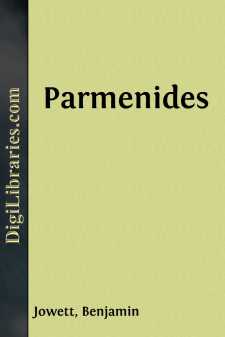Categories
- Antiques & Collectibles 13
- Architecture 36
- Art 48
- Bibles 22
- Biography & Autobiography 813
- Body, Mind & Spirit 142
- Business & Economics 28
- Children's Books 15
- Children's Fiction 12
- Computers 4
- Cooking 94
- Crafts & Hobbies 4
- Drama 346
- Education 46
- Family & Relationships 57
- Fiction 11829
- Games 19
- Gardening 17
- Health & Fitness 34
- History 1377
- House & Home 1
- Humor 147
- Juvenile Fiction 1873
- Juvenile Nonfiction 202
- Language Arts & Disciplines 88
- Law 16
- Literary Collections 686
- Literary Criticism 179
- Mathematics 13
- Medical 41
- Music 40
- Nature 179
- Non-Classifiable 1768
- Performing Arts 7
- Periodicals 1453
- Philosophy 64
- Photography 2
- Poetry 896
- Political Science 203
- Psychology 42
- Reference 154
- Religion 513
- Science 126
- Self-Help 84
- Social Science 81
- Sports & Recreation 34
- Study Aids 3
- Technology & Engineering 59
- Transportation 23
- Travel 463
- True Crime 29
Parmenides
by: Benjamin Jowett
Description:
Excerpt
INTRODUCTION AND ANALYSIS.
The awe with which Plato regarded the character of 'the great' Parmenides has extended to the dialogue which he calls by his name. None of the writings of Plato have been more copiously illustrated, both in ancient and modern times, and in none of them have the interpreters been more at variance with one another. Nor is this surprising. For the Parmenides is more fragmentary and isolated than any other dialogue, and the design of the writer is not expressly stated. The date is uncertain; the relation to the other writings of Plato is also uncertain; the connexion between the two parts is at first sight extremely obscure; and in the latter of the two we are left in doubt as to whether Plato is speaking his own sentiments by the lips of Parmenides, and overthrowing him out of his own mouth, or whether he is propounding consequences which would have been admitted by Zeno and Parmenides themselves. The contradictions which follow from the hypotheses of the one and many have been regarded by some as transcendental mysteries; by others as a mere illustration, taken at random, of a new method. They seem to have been inspired by a sort of dialectical frenzy, such as may be supposed to have prevailed in the Megarian School (compare Cratylus, etc.). The criticism on his own doctrine of Ideas has also been considered, not as a real criticism, but as an exuberance of the metaphysical imagination which enabled Plato to go beyond himself. To the latter part of the dialogue we may certainly apply the words in which he himself describes the earlier philosophers in the Sophist: 'They went on their way rather regardless of whether we understood them or not.'
The Parmenides in point of style is one of the best of the Platonic writings; the first portion of the dialogue is in no way defective in ease and grace and dramatic interest; nor in the second part, where there was no room for such qualities, is there any want of clearness or precision. The latter half is an exquisite mosaic, of which the small pieces are with the utmost fineness and regularity adapted to one another. Like the Protagoras, Phaedo, and others, the whole is a narrated dialogue, combining with the mere recital of the words spoken, the observations of the reciter on the effect produced by them. Thus we are informed by him that Zeno and Parmenides were not altogether pleased at the request of Socrates that they would examine into the nature of the one and many in the sphere of Ideas, although they received his suggestion with approving smiles. And we are glad to be told that Parmenides was 'aged but well-favoured,' and that Zeno was 'very good-looking'; also that Parmenides affected to decline the great argument, on which, as Zeno knew from experience, he was not unwilling to enter. The character of Antiphon, the half-brother of Plato, who had once been inclined to philosophy, but has now shown the hereditary disposition for horses, is very naturally described. He is the sole depositary of the famous dialogue; but, although he receives the strangers like a courteous gentleman, he is impatient of the trouble of reciting it....












